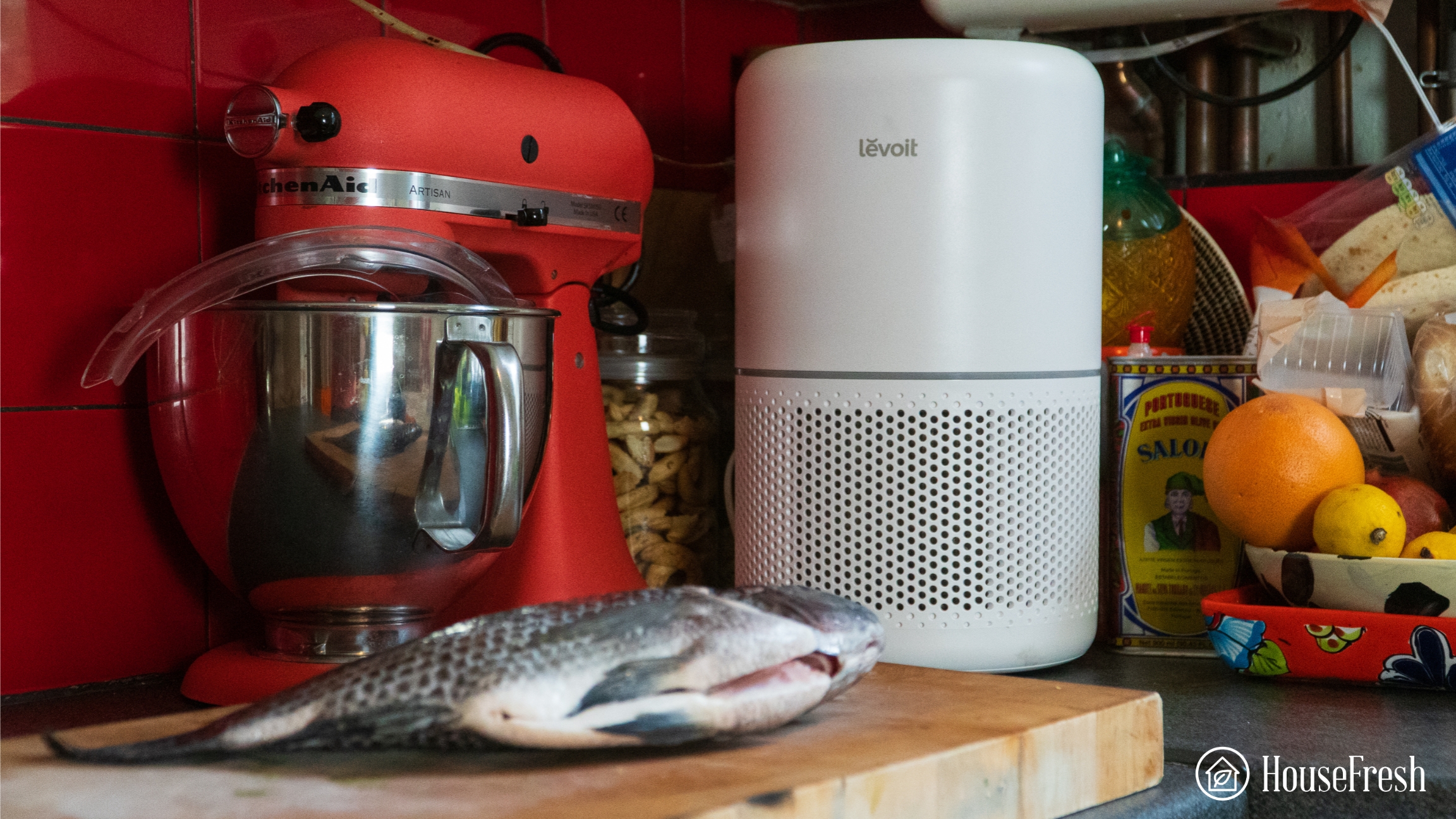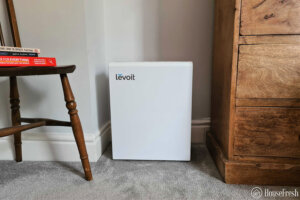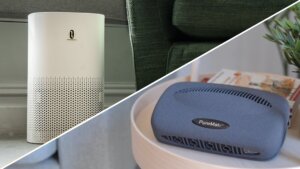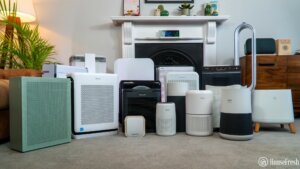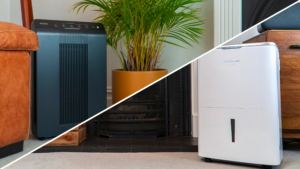Our sense of smell is one of the most acute senses we have. Surprisingly, we can distinguish more than one trillion scents.
Now, sensitivity to smell varies from person to person. But when it comes to the place we call home, all living spaces have a distinguished smell (or a mix of them). Some can make us feel safe and at ease. Others, like the infamous old house smell, pet urine, or dog smell, are unwelcome, to say the least.
Good ventilation and proper cleaning make a world of difference. But air purifiers also offer a practical solution for those unwanted stenches.
However, you’ll need a unit that has an activated carbon filter. HEPA filters can help to some extent, such as getting rid of moldy odors. But the true hero is an activated carbon filter.
Understanding how activated carbon filters remove smells
Activated carbon is a sorbent material that can deal with molecules that HEPA filters can’t.
Unlike the solid particles HEPA filters can capture (such as pollen, dust, or mold spores), smell molecules are in a gaseous state. Gas plumes, like odor, move at much higher speeds than solid particles. Besides, the molecules are much smaller and capable of slipping through the fiber maze of HEPAs.
How activated carbon filters work
The activated carbon filter on air purifiers removes gaseous pollutants (and odors) through physical adsorption. The gas molecules drawn into the air purifier get trapped on the surface of the activated carbon filter as they pass through.
Physical adsorption also means no added electronic processes, such as ionization or UV light cleaners, that could generate hazardous chemical by-products.
However, the bounded pollutants accumulate in the charcoal. So, regarding activated carbon, the amount of sorbent area available is important. The larger the surface, the better. More molecules can be trapped in the material before reaching saturation.
This is why the carbon is “activated,” meaning it’s injected with oxygen to create countless microscopic pores. The process maximizes the sorbent capacity of the carbon while minimizing pellet size so it can fit in the filter.

This brings us to the difference between granular or pelleted carbon filters and carbon-impregnated fabrics. The latter is cheaper and more common in air purifiers, but the available surface for adsorption is limited.

What activated carbon filters can and cannot help with
Activated carbon can filter more than smells —but not everything:
What activated carbon filters can remove from the air
What activated carbon filters can’t remove from the air
Activated carbon can reduce the lingering stench of cigarette smoke. There are various techniques to clear the smoke out of a room. However, it’s worth noting that no consumer air purifier can eliminate all traces of third-hand smoke produced by smoking indoors and the risks it poses.
As activated carbon is so efficient at removing gasses such as VOCs (volatile organic compounds), an air purifier with a charcoal filter comes in handy against gaseous contaminants if you:
- Made renovations at home
- Want to remove burnt smells
- Live near construction sites, industrial areas, or busy roads
- Painted your home recently and want to reduce exposure to paint fumes.
We’ve selected three units based on our hands-on performance tests and data. From over 50 air purifiers we’ve reviewed, our top three choices (with pelleted carbon) are:
- The Winix 5500-2 as our best overall choice. It boasts an impressive CADR for its price, it’s fast (22 minutes to clean our test room without an ionizer), and comes with an auto mode so you can set and forget it.
- The IQAir HealthPro Plus is unbeatable for larger spaces. Packed with 5lb of activated carbon, the HealthPro Plus can tackle odors, VOCs, and all kinds of airborne pollutants. Its immediate downside is the price, but the company tests every unit in Switzerland to ensure its performance meets the IQAir standards. Worth every penny.
- The Levoit Core 300 is a basic yet reliable small unit for those on a budget. Besides, for under $100, this is one of the only budget air purifiers equipped with pelleted activated carbon.
Should you use an ozone generator to remove odors?
Ozone generators are advertised as miraculous fix-all solutions for severe odor issues. Promotion of such devices is based on the ozone (O3) capacity to react with other chemicals, deteriorating particles and gas molecules to eliminate the source of smell.
Ozone can sound like an efficient air cleaner, but it’s actually the opposite. O3 is highly reactive. While it can deal with some molecules, it’ll also create other toxic and dangerous byproducts. Not to mention that, on its own, it’s a potent lung irritant and a health hazard.
For odors, when ozone concentrations are kept below public health standards (0.005 ppm), it’s ineffective against odor-causing chemicals. In addition, ozone can alter your sense of smell and mask unwanted stenches instead of eliminating them. Or even worse, transform them into more toxic compounds.
But then, it’s not just the research that discourages ozone generators. Real users have shared their dangerous and hazardous experiences.
Even if you used an ozone generator for a short time in an empty home, there’s still little information available about the by-products ozone could leave behind.
Besides, I find it hard to understand the logic of pumping ozone into the air. Why pollute our environment with more of this toxic gas?
Wrapping up
The bottom line is air purifiers can help with unwanted smells, but they need to have activated carbon.
However, if you’re considering investing in a robust air purifier, make sure it features these three filtration stages: a pre-filter that removes large particles such as hair, lint, and dust, a HEPA filter that traps fine particulates as small as 0.3 microns, and the activated carbon filter to remove harder-to-eliminate contaminants, such as odor molecules and toxic fumes.
SOURCES
- ASHRAE. (2023). Air Cleaners for Gaseous Contaminants. ashrae.org
- Boeniger, M. F. (1995). Use of ozone generating devices to improve indoor air quality. pubmed.ncbi.nlm.nih.gov
- California Air Resources Board. (2023). Hazardous Ozone-Generating Air Purifiers. arb.ca.gov
- Connecticut Department of Public Health. (2017). Ozone Generators What You Need to Know. portal.ct.gov
- IQAir. (2018). Can air purifiers trap gases effectively? iqair.com
- U.S. Environmental Protection Agency. (2023). Ozone Generators that are Sold as Air Cleaners. epa.gov
- U.S. Environmental Protection Agency. (2018). Residential air cleaners. A technical summary. epa.gov
- U.S. Food and Drug Administration. (2023). Code of Federal Regulations – Subchapter H: Medical Devices. Special Requirements for Specific Devices. fda.gov
- Young, B. D., et al. (2020) Odors: from chemical structures to gaseous plumes. ncbi.nlm.nih.gov

